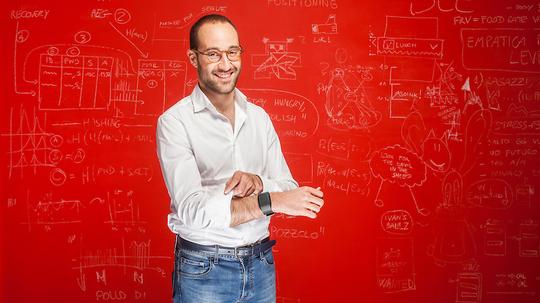
When Dr. Jacqueline French, the chief scientific officer at the Epilepsy Foundation, began her work around epilepsy decades ago, there were few ways outside of the hospital to gather information about seizures caused by the neurological disorder.
“Thirty years ago, we didn’t have any detection devices at all," said French.
The doctor never thought that one day a light smartwatch with skin sensors would be among the most promising devices used to gather data about major seizures. The Fitbit-style medical device is called Embrace and its maker is Empatica, a startup headquartered in Cambridge that also has an office in Milan, Italy.
Thanks to Embrace, collecting data about -- and potentially managing -- certain types of seizures without invasive or clunky hospital equipment is becoming a reality.
“It’s a lot easier to wear a watch... and it’s less identifying and stigmatizing,” said French, who has assisted Empatica with research, noting that Embrace is mainly useful for detecting the most dangerous type of grand mal seizure called tonic-clonic convulsions. “It is one of a number of devices that are going to be game-changers.”
Founded in 2011, Empatica handles both the hardware and software of its signature device, building algorithms and artificial intelligence technology, said Empatica’s chief executive, Matteo Lai. Currently, about 52 employees work for the company, with about three-quarters of them located in Italy and the rest in the Cambridge headquarters.
The company is eyeing a recent FDA approval to market its Embrace epilepsy smartwatch as a medical device, as well as products for autism and depression, to fuel plans to expand the company.
“It’s the first time that a smartwatch was approved as a medical device,” said Lai.
Embrace, which was approved earlier for sale in Europe, costs consumers around $250 with monthly subscriptions that run about $10 to $20, a price that Lai said should make it accessible even without insurance reimbursement.
So far, the company has raised a total of about $7.5 million, with Italian investor Innogest leading the way, and plans to close another round this year. The capital would expand the sales team and it would be “substantially more” than the company's latest round of funding, a 2016 Series A round worth about $5 million (Lai declined to disclose the target for the company's next round).
“We don’t need the money to stay alive, we need the money to grow,” he said, suggesting Empatica is making money off sales and subscriptions.
Entering other markets, the company is also building a partnership in Japan to use its products for tracking workplace stress. Empatica has so far limited its own products to epilepsy, autism and depression, but other researchers are using the smartbands in various clinical trials and studies for multiple sclerosis, Parkinson's, autism and other conditions. Currently, an associate professor at Northeastern University is using to Empatica’s sensors to detect aggressive outbursts in some people with autism spectrum disorder.
Lai sees its products -- conceived from research at MIT -- as advancing data collection, research, drug trials, management and treatment of – and potentially predictions of – several neurological conditions.
To bring his point home, Lai talked about the advances in seizure detection thanks to the devices, noting that much information about patients who have seizures is spotty.
“You rely on the patient for the data of those events. You don’t know how long it lasted and what kind of event it was,” he said. “It’s very, very inefficient data. It’s a huge problem for doctors, practitioners, and also for pharma companies.”
Because Empatica’s devices are easy to wear and use, he said, they’re more likely to be worn by patients, collecting valuable data.
“A lot of consumer devices don’t have quite good enough data so you can’t do anything with them… on the other end, you have medical devices that are very high quality, but they are very difficult to use, are cumbersome and they’re big, so patients refuse to use them. It’s a big problem in clinical trials,” Lai explained.
Empatica's research goes back to 2007 on a project led by Prof. Rosalind Picard, now Empatica’s chief scientist, at the MIT Media Lab. Picard, who also co-founded Affectiva (a local company focusing on Emotion AI that raised more than $26 million), was developing consumer-friendly wearables as part of a previous venture, Physiio International Inc. In April 2014, Physiio completed a merger with Empatica and the parent company was renamed Empatica Inc.
“It was actually serendipitous,” Lai told BostInno. “The original project was monitoring stress for kids who had autism. They were nonverbal and they couldn’t speak in a way to say that their stress was going up. We were using skin conductors to monitor that.”
During the study, said Lai, one of the kids happened to have a seizure, which is common among some people with autism.
“One of the signals went up immensely, in a way that was not seen in the rest of the population,” he said.
“At the beginning, they felt that the device was broken, but actually, the type of seizure that he had only mapped to one part of the brain, so we saw the response on only one side.”
The team discovered their device was picking up on seizures and, in fact, not broken.
“The idea that you could do automatic detection with a life-threatening condition,” he said, “it was kind of revolutionary.”
Still, Dr. French says there’s much work to be done in the area of research and treatment.
“There are other smaller seizures that sometimes can't get picked up by the device,” she said. "As people continue to acquire data through this mechanism, we’re going to learn more.”
BostInno's Lucia Maffei contributed to this report.








